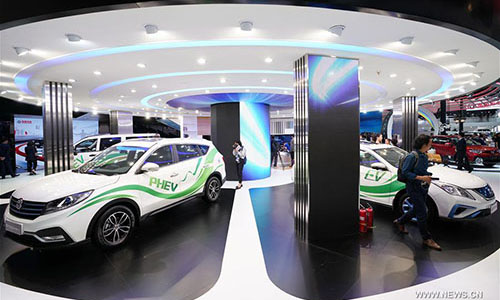China scraps vehicle purchase tax for all NEVs
Source:Global Times Published: 2020/4/22 22:18:40

Visitors view displayed new energy cars at the 2018 Beijing International Automotive Exhibition (Auto China 2018)in Beijing, capital of China, April 25, 2018. The Auto China 2018 will last from April 25 to May 4 in Beijing. (Xinhua/Ju Huanzong)
China on Wednesday scrapped the vehicle purchase tax on new-energy vehicles (NEV), effective in 2021 and 2022, in its latest efforts to lift car consumption in China, especially NEVs, at a time when the coronavirus epidemic has squeezed demand.
The new policy was announced by three government departments including the Ministry of Finance and the State Taxation Administration.
"The policy shows that China has not swayed in its support for NEV development, particularly as the coronavirus has knocked car consumption demand in China, whether for NEVs or traditional oil-fueled vehicles," Wu Shuocheng, an independent car analyst, told the Global Times.
In the first three months, sales of NEVs slumped by 56.4 percent year-on-year to 114,000 in China. In total, sales of passenger vehicles slumped by 41 percent in the first quarter in China.
However, Wu said that the vehicle purchase tax exemption policy will have a limited effect, as it can't make up for some of the major "pain spots" of NEVs.
"High cost, short endurance mileage and difficulty in battery charging … with those shortcomings, consumers wouldn't choose to purchase NEVS just because they can save thousands of yuan in tax," said Wu.
He also noted that as NEV sales only account for a small portion of China's entire car market, the policy's impact in stimulating the car market in general will be limited.
China sold about 25.8 million vehicles in 2019, of which about 4.7 percent were new-energy vehicles.
"I suppose that the sales slump for NEVs this year will be even deeper compared with traditional cars if there are no 'stronger' policies such as heavy subsidies being rolled out," Wu said.
Posted in: ECONOMY